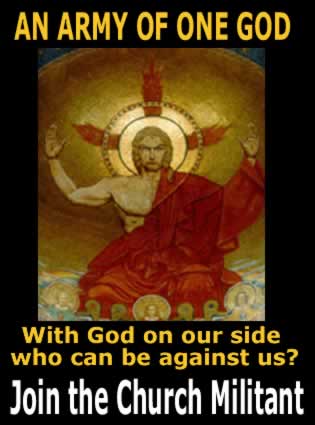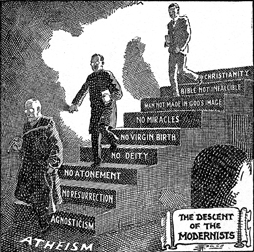It seems that whenever I have
to be on the road for more than an hour or so, I find myself listening to a particular
CD I keep in the car. I’ve mentioned it before (here
and here);
it’s a talk (and also an
article) by Rod Pead, editor of Christian Order magazine, delivered
at a “Faith of Our Fathers” conference 13 years ago.
The last few times I’ve
listened to Mr. Pead’s talk, I have been particularly struck by the segment on the
“Catholic mind”. More and more I see that the Catholic mind is becoming a thing
of the past. Catholics today often don’t really know how to think as Catholics because they haven’t
been taught how, and they aren’t exposed to examples of Catholic thinking. Such
an example can be as simple as a priest saying to his flock, “Let’s take a look
at what the Church teaches” on a particular subject. But so often, we hear only
the priest’s opinion, and even worse, too often that opinion might just mesh
nicely with the secular, worldly opinion. We hear St. Thomas and St. Augustine
dismissed as irrelevant, and in general the logical analysis inherent in truly
Catholic thinking is not taught or encouraged these days.
Here’s
what Rod Pead has to say on the subject. And if what he said thirteen years ago
was true then, it is, sadly, even more true today. (All emphases are mine.)
Well,
I'm telling you, if we adopt this attitude; if we opt for life in this
Establishment Catholic comfort zone of perennial
appeasement and Quietism; if we are more interested in retaining an air of
respectability than in confronting, strongly and bluntly, this mysterious darkening of episcopal hearts
and minds for fear of being called 'extremists' and 'zealots' and 'fanatics';
if we continue living this liberal illusion that we can act justly without
risking our good name, our tranquil life, our well-being - then we might as
well stand around fretting like Peter and wait for the cock to crow!
I’m afraid that those of us who
are willing to say “the emperor has no clothes” will be castigated as much or
more so today than we would have been in the year 2000. Just recently, when I
tried to make a case for Church teaching on a particular topic, I was accused
by someone as being “one of those people who are more concerned about doctrine
than the love and mercy of God”. Unfortunately, comments by Pope Francis have
been taken to mean that standing up for the truth is not a good thing.
Mr. Pead goes on:
But our woes are not all down to the
Establishment Pollyanna's. We are all soaked in human respect; full to
the brim with false charity. I guess affluence and Catholic faith have
never been good bedfellows: food on the table and a warm bed at night does
little to encourage the vigorous prayer life required to sustain the truly Catholic
mind we need in order to act justly. How else are we to explain the lack of passion and sense of urgency before
the disaster we face. It is true that while at the moment we find we can't
live with the bishops, we know, too, that by God's design we can't live without
them, and that there is only so much we can do. But have we done even that much? Have we prayed and fasted and done penance and really begged God on our knees
to convert the hearts and minds of the bishops? Have we consistently
pleaded with Him to take the hirelings who will
not respond to His grace to their early reward, and send us real Catholic Shepherds in their stead?
 |
| The persistent widow |
We
each need to ask ourselves these questions, because it is hard to believe that
God would not have sent Britain at least some orthodox episcopal relief
if He had been badgered sufficiently - Christ Himself told us, in the parable
of the unjust judge, that we should pray continually and never be discouraged [Lk
18 1:8]. Just as the unjust judge was worn down by the persistent visits
of the widow seeking redress against someone who wronged her, Our Lord told the
people: "will not God give redress to his elect, when they are crying
out to him, day and night? Will he not be impatient with their wrongs? I tell
you, he will give them redress with all speed." And then Christ
immediately adds, underlining the point I made earlier, "But ah, when
the Son of Man comes, will he find faith left on earth?" And so I
repeat, and I repeat it more for my own benefit than anyone else's: are we really praying for the
conversion of the hirelings or their replacement by strong, solicitous, Catholic
Shepherds - as if we believe? Given
Christ's promise, I can't imagine that enough of us are.
A CATHOLIC
MIND
And because our prayers are not what they should be our thoughts are not what they should be. Only by continual prayer can
we put a spiritual disposition on everything that we do and thus keep the
Commandments and live peacefully and unperturbed, come what may, in God's
presence, in union with the Father, the Son and the Holy Spirit, leaving all
and suffering all according to His providence, including the agonies of our
present crisis.
[As a quick aside…hasn’t Rod
Pead just described a “personal
relationship with Jesus”?!?]
This
is all about retaining that increasingly rare commodity in the neo-pagan West: a Catholic mind, encompassing a truly Catholic view of life. A view once
summarised as that "which sets all earthly values within the context of the eternal, the view which
relates all human problems - social, political and cultural - to the doctrinal foundations of the Catholic Faith,
the view which sees all things here below in terms of God's supremacy and
earth's transitoriness, in terms of
Heaven and Hell."
Ah
yes. That “doctrine” thing again. Doctrine is at the foundation of the Church.
If we do not know it, believe it, and live it, how can we be Catholic? How can
we bring the light of the Church – the light of Christ – to the darkened world
around us? How can we have a “personal relationship” with Jesus outside those
doctrinal foundations of the Church?
Rod
Pead:
It is
because our thoughts are not ordered in this Catholic way that we do not hate the insidious Modernist
heresy as we should; as the polluting of God's truth, which is the worst of
all impurities. "Where there is no hatred for heresy," said a
famous convert, "there is no holiness." And without holiness,
truth rapidly becomes a dead letter and any prospect of unity dies with it.
On
the other hand, one who possesses a
truly Catholic mind is alarmed by heresy! He sees that souls are being lost now! And this sense of urgency alerts
him, intuitively, to the deeper implication of Cardinal Manning's contention
that "all conflict is theological". He sees, in other words,
that everything, every debate on
whatever issue returns to Catholic moral and doctrinal realities and,
therefore, that a healthy, unified Catholic Church precedes and gives rise to a
healthy, unified and coherent State.
Again: doctrine is important! It
is essential! Don't let anyone tell you otherwise.
And
he sees all about him the catastrophic
consequences for society of the Modernist heresy destroying the Western Church.
Thus, he doesn't put the cart before the horse; he doesn't fool himself into
accepting that a sick Church can heal a sick world; he knows that we have to heal the Church and unite ourselves - Catholics of the
Latin Rite - before trying to heal the world and unite divided Christianity. And
so with that broad appreciation of the importance of a healthy Church - a
Church untainted by the stench of heterodoxy and heresy - the Catholic thinker is not as easily pleased as the average orthodox layman whose
standards, after years of struggle, have plummeted to desperate levels.
A prelate stands up to condemn sodomy or abortion - the minimum one might
expect of a Catholic bishop - and we go weak at the knees and lose all sense of
proportion in our rush to congratulate him.
In our desperation for something - for someone - to hold on to, we
blithely ignore the standards set by St Paul, who wrote to Titus that "a
bishop must be beyond reproach, since he is the steward of God's house…",
and that the bishop is duty bound to "rebuke sharply"
the "many disobedient, vain talkers and seducers" who "bring
ruin on entire households by false teaching"; false teachers who, St.
Paul concludes: "must be silenced." [Titus 1:7-13].
Learn your faith. If you’ve
been studying the current Catechism,
or reading only Vatican II and post-Vatican II documents, expand your horizons
to consider traditional Church teaching. Look at papal encyclicals that don’t
mince words, that exhibit the Catholic mind Rod Pead is talking about.
Fast and pray. Do penance.
And do it more.
Sack cloth and ashes, anyone?!


Now where can you find sack cloth in Oregon? :-). Kathy
ReplyDeleteHey, D&B sells burlap bags, I believe! That could work! ;-)
ReplyDeleteAll that Rod Pead states is sound and true but, more and more these days, the Fatima message is to the fore: "Fast, pray and do penance".
ReplyDeleteThank you for this post Jay.
Absolutely, Richard. I think we would all do well to keep the Fatima message in our minds continually.
ReplyDeleteThank you for this great post. I have been reading Pius X on the heresy of modernism, and it is as relevant today as it was when it was written, if not more.
ReplyDeleteAmen!!
ReplyDeleteI love this article. This perfectly describes what I think and believe.
Modernism MUST be condemned. I will continue to say it and call it out for the evil it is. Modernism has attempted to destroy the Faith. If you're awake and look around you, you'll notice the devastation in the vineyard.
~Hannah
Hannah,
ReplyDeleteI know you are young, but have you read Von Hilderbrand's "The Devastated Vineyard"?
An excellent book on the revolution that has taken place in the Church.
See it here: http://www.amazon.com/Devastated-Vineyard-Dietrich-Von-Hildebrand/dp/B000717XBG/ref=sr_1_1?s=books&ie=UTF8&qid=1382440860&sr=1-1&keywords=the+devastated+vineyard
Catechist Kev
Catechist Kev,
ReplyDeleteI have not. I might ask for it for Christmas! Thanks for the idea.
God bless.
~Hannah